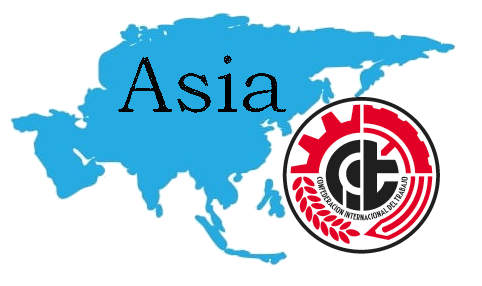It’s difficult writing about Covid-19 from Madrid, one of the hardest hit towns in the world. The death toll in the region alone is higher than for the whole of China. Officials say it’s slowly improving, but scores of people continue to pass away every day. People I knew from my neighbourhood have died. Others are critically ill, including union comrades. This is hard. We all want it to be over.
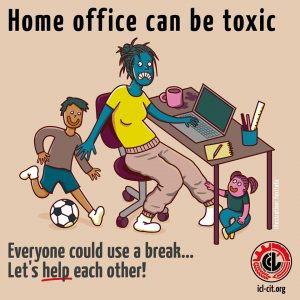 Feelings of isolation and frustration are common in the lockdown. Kids have been inside for more than a month now. Their stress and anxiety are showing in different ways. The littlest ones, particularly, can’t understand what’s going on. The quarantine is being strictly enforced, indeed, and they’re not spared. Many families living in overcrowded accommodations or with poor sanitation are having it even worse. This is hard indeed. We all so much want it to be over.
Feelings of isolation and frustration are common in the lockdown. Kids have been inside for more than a month now. Their stress and anxiety are showing in different ways. The littlest ones, particularly, can’t understand what’s going on. The quarantine is being strictly enforced, indeed, and they’re not spared. Many families living in overcrowded accommodations or with poor sanitation are having it even worse. This is hard indeed. We all so much want it to be over.
Jobs and livelihoods have vanished. More than three million workers across Spain have been temporarily laid-off and 800,000 jobs were destroyed in March alone. Crucial sectors for the economy (tourism, hospitality…) lay in ruins and prospects are bleak. The picture is very similar across the globe. This will be even harder, and it doesn’t look like it will be over soon.
In the meantime, the other issues that our societies were facing before the current crisis are still there. Inequality, poverty and exploitation are rampant across the globe, authoritarian regimes and xenophobic populism have not gone away, and global warming and its consequences continue to accelerate.
When this is over, when Covid-19 is finally gone, we’ll need to get down to the task of fixing this broken world. The times we’re going through, this collective experience, is an awakening call. It is now obvious that ignoring or denying those global issues is done at our peril. We may try as hard as we want to keep them out of our minds, to keep going as if nothing is happening, but they will come knocking on our doors.
There’s not going back to normal. We should not go back to normal. No believing that state and politicians (any state, any politicians) will keep us safe, because it is obvious that they won’t. No buying into the whole liberal economic bullshit of eternal growth, because there’s nothing of the like. No bartering our lives away, in mindless jobs for endless hours. No handing over our collective decision-making capacity to bureaucrats elected in a ballot box…
Fear is powerful and pandemics are scary. There’s a likely chance that many will be ready to surrender rights and freedoms, hopes and aspirations, for the promise of security and health. But the only way to cure fear is trust. Trust in ourselves, in our collective strength, in each other’s support and comradeship, in solidarity…To make that support and solidarity effective, to feel its warmth in our lives and to harness it to address global issues, we need to build powerful organisations that bring us together. It can be a grassroots union, a tenant’s association, a group against cutbacks and austerity, a radical environmental campaign, a feminist collective or any other. All those and many more are required to implement the change, on a revolutionary scale, that we need. Only the people help the people!
So don’t go back to normal. This time, get militant.
Miguel Perez, ICL’s secretary
1.- Surveillance & Authoritarian Regimes
Over the last decades there’s been a rise in the number of authoritarian regimes, that mix little or no political freedom with naked market capitalism. Obviously, the paradigm in this respect is China, but there are many others, like Russia, Turkey, Saudi Arabia, etc. At the same time, conservative populism has been on the rise virtually everywhere. Not only in developed countries, where the excuse of immigration has often been used for a general shift to the right of the political spectrum, but also in places like India.
Meanwhile, state and company surveillance of citizens and consumers has become normalised all over the world.
Now, the Covid-19 crisis brings about another twist to these developments. It is starkly obvious that the capacity to curtail the spread of the disease has differed hugely between countries. Probably none has been as successful as South Korea, but also China seems to have done well, considering the odds and even allowing for a high level of official figure manipulation. In contrast, Italy, Spain and the US seem to be on the back foot and are experiencing higher death tolls than anywhere else in the world.
There are probably many reasons for this, and each case is unique. An in-depth discussion is beyond the scope of this text. However, it can be confidently said that many will point to the surveillance and control that many Asian states keep on their citizens as one of the main reasons. Also, to the fact that an authoritarian government, like the Chinese, can quickly introduce and enforce harsher measures at the beginning of the outbreak.
A likely result of the health crisis, in general, will be a widespread acceptance of more authoritarian regimes and, certainly, more state surveillance. There are already voices pointing in that direction. The use that the South Korean authorities have made of facial recognition, tracking apps, mobile phone records, etc. in finding infected people will surely make these developments more palatable to many in the future. After all, when life is on the balance discussions are idle and fear is a very powerful motivation.
But these tools of surveillance are also some of the backbones of the modern authoritarian regimes (the others being time-tested physical repression of opponents). Throw all this in the mix with nationalist politicians in overdrive, xenophobic populists and rabid conservatives, pseudo-communist dictators or theocratic governments and the powder keg is ready to blow up at any moment.
It seems like we will have to take one page or two from Hong Kong protesters on how to keep our movements safe in the face of massive surveillance and state repression.
2.- Funding the old ways
There’s no question that the health crisis is going to wreck global economy. It is has already done so to some extent, but the coming months will see much more of it. The numbers are as widely known as they’re staggering, no need to repeat them now. Predictions are dire. Truly, you don’t need to be a Nobel prize winning economist to understand that millions of workers losing jobs and companies going bust around the globe can quickly cascade into a debacle for banks, stock markets and the financial world in general.
Coming hot on the heels of the 2008 recession, the prospect is terrifying for governments. So much so that many were ready to gamble their citizen’s lives for the sake of keeping the economy running. Think the US, the UK, etc. Failing this, they’ve all been quick to take out the check book for magic trillionaire stimulus packages. The money that couldn’t be found during the past years of cutbacks and austerity measures has suddenly materialised and is ready to be handed out generously. Our comrades from USI in Italy have already pointed out the effects of cuts to the health system in their country and its repercussions in the current crisis (https://www.iclcit.org/italy-statement-by-usi-cit-health-workers/). Surely, the same could be said of any other place.
We’ve been here before. After the 2008 financial crash, amid a fanfare of calls to reform capitalism, millions were used to bail out banks and other companies. The discourses faded quickly from memory, the owners of big companies pocketed the money, thank you very much, and then left the workers to shoulder the weight of their bailouts through cutbacks and austerity. Nothing happened, other than a worsening of labour and living conditions for workers.
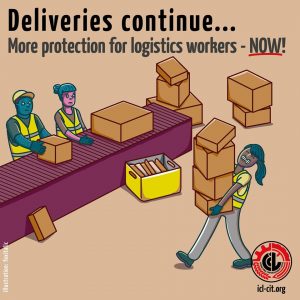 Very likely, now all those billions in stimulus packages will be used to keep oil pumping, planes flying, cars running, ships sailing, power plants burning coal, cattle ranchers felling the rainforest, factories producing cheap plastic junk for Halloween and Christmas, sweatshops stitching the trendiest fashion items, tech companies unveiling their latest gadgets….as before.
Very likely, now all those billions in stimulus packages will be used to keep oil pumping, planes flying, cars running, ships sailing, power plants burning coal, cattle ranchers felling the rainforest, factories producing cheap plastic junk for Halloween and Christmas, sweatshops stitching the trendiest fashion items, tech companies unveiling their latest gadgets….as before.
Indeed, that is the plan. Go back to how things were as quickly as possible, pretend COVID-19 never happened and go on ignoring the many other global issues that are out there. But this pandemic has shown that the out-of-sight out-of-mind approach that our societies are so good at taking does not really work. Simply going around our daily business and hoping that the experts and the politicians will keep us safe is not a viable strategy. It never was, obviously, but no one can deny it now. The health crisis is the wake-up call to realise that we’re in deep shit.
3.- Funding the next crisis
Some have pointed out to the benefits of the crisis for the environment. Pollution levels are at an all-time low and animals and plants are reclaiming natural spaces deserted by humans during the lockdown. However, even if anyone was inclined to consider these developments good news, amidst a huge humanitarian crisis, they are likely to be short lived. Indeed, the ultimate outcome can be worse than before.
For one thing, these changes are only temporary. Then, companies and governments are already making plans to relax environmental protections and to ditch sustainability plans for the sake of economic recovery. This means new coal-fuelled power plants, to provide cheap energy quickly for struggling factories, or more oil rigs and subsidized fuels to support airlines and shipping, to mention just a few. Even accounting for reduced demand due to the economic slowdown, the health crisis could be very detrimental for the environment.
The thing is that global warming and environmental collapse have continued unabated. They haven’t stopped with the quarantine, just because no one’s watching. The ice caps continue to melt at an accelerating rate, sea levels to rise and forests to burn. Indeed, some studies link the increase in pandemics to the encroachment on human populations in natural areas and their degradation.
But the environmental emergency is not the only one ravaging the planet right now. Economic inequality, poverty and exploitation continue to plague whole communities across the globe. The effects of the health crisis can certainly be devastating for them. Not only in terms of limited access to health care, though that is certainly a factor. For example, COVID-19 has already spread more and been more deadly in impoverished communities (predominantly black) in the US. But also, as has been the case in previous economic crises, it is likely that the brunt of the slowdown will be borne by workers across the globe. From North to South America, Europe to Asia, there’s a working class that will feel (is already feeling) the effects of the economic slowdown.
If the 2008 crisis is anything to go by, jobs and livelihoods will be lost, wages will be pushed down, evictions and homelessness will increase and the working and living conditions will worsen in general. Poorer communities in developing countries face the prospect of famine, while social exclusion can become widespread in other parts of the globe. Meanwhile, bosses and business owners will receive generous stimulus packages from governments and tax-payers money, and they will surely find ways to pocket them. No wonder inequality skyrockets after each economic crisis.
4.- Only the people help the people
Our FORA-Argentina comrades have said it loud and clear (https://www.iclcit.org/argentina-about-coronavirus-and-the-working-class/). Don’t give zillions in stimulus packages to our bosses. Give us workers the money and we’ll look after ourselves and our communities!
Certainly, faced with the prospect of environmental and economic collapse, communities could use that money to set up alternative ways of managing resources, that serve the interests of the people and not of shareholders, that are respectful of the environment and that fight inequality and social exclusion. At this point in time, no one can argue that the world is not in need of better-funded health systems, proper housing and sanitation for all, guaranteed access to education, environmentally sustainable sources of energy, decent living conditions…to start with.
 None of these things will be achieved by rescuing struggling companies that make a profit out of polluting the environment, exploiting workers and handing out bonuses and dividends. Nor by giving money individually to consumers, so they can go out and spend. The “go and buy yourself something nice” approach taken by the Trump administration, in the face of a deadly systemic crisis, is the best example of the market mindset, that reduces social problems to individual consumer choices. As if buying new clothes or cars was going to conjure the virus away.
None of these things will be achieved by rescuing struggling companies that make a profit out of polluting the environment, exploiting workers and handing out bonuses and dividends. Nor by giving money individually to consumers, so they can go out and spend. The “go and buy yourself something nice” approach taken by the Trump administration, in the face of a deadly systemic crisis, is the best example of the market mindset, that reduces social problems to individual consumer choices. As if buying new clothes or cars was going to conjure the virus away.
No. Social and systemic issues require social and systemic solutions. And none of these will happen if governments proceed unchecked and dump trillions to save an ailing economy, directly or through encouraging consumer spending. Drastic and lasting changes must be made. So drastic, in fact, that they would be revolutionary. A revolutionary transformation that no state, government, business owner or politician is willing or able to implement.
In the coming months and years, it will be down to us, workers from across the globe, to devise and implement a way out. Considering the many issues we must address, it may seem a daunting task. However, pulling together, building comprehensive decentralised movements based on solidarity and mutual aid and developing strong organisations and international links and networks, there’s nothing the collective intelligence of hundreds of millions of people can’t achieve. We are a powerful force. With tools at our disposal to interlink, communicate and share, there’s no stopping us. In the current situation, feeling dreadful and overwhelmed about the future is normal, if we look only at politicians and businesspeople for answers. It is us workers, the unemployed, pensioners, students, migrants…who are in a position to collectively chart a way ahead. Certainly, trust in our own ability and capacity is the only vaccine against fear.
However, solidarity and mutual aid need proper organisations to go beyond individual acts of kindness and become social forces of their own, with an unlimited potential for transformation. Environmental protection can’t be reduced to consumer choices, much as many greenwashing companies and governments would want us to believe. It requires powerful radical ecologist groups taking action. Women’s equality won’t become a reality just by passing laws. A proper cultural shift is required, that can only come from the hands of women and men combating sexism in their daily lives. Xenophobia, racism and aggressive nationalism won’t go away unless we chase them off our streets.
Finally, the deadly viruses of inequality, poverty and exploitation will continue to dominate the international order, as long as we allow it to be ruled by the forces of capitalist globalisation. In that respect, anarchosyndicalist and revolutionary unions are tools at our disposal to fight back and defend workers’ rights. This will be crucial in the coming months of economic slowdown, so that workers are not made, once again, to bear the brunt of the crisis. But not only that. They are also essential parts of any movement for social and economic transformation. Sections of revolutionary unions in the workplace form the basis from which workers can reshape production, to make it serve their real needs. They’re the building blocks of an economy that protects life, our lives, and not profit.
Only the people help the people. Only ourselves can save ourselves. The common and global issues that we have to confront are many and complex. So we need all hands on deck. Now there’s no more looking the other way. This time, go and get militant.
International Confederation of Labour
Also available in:
 Español (Spanish)
Español (Spanish)



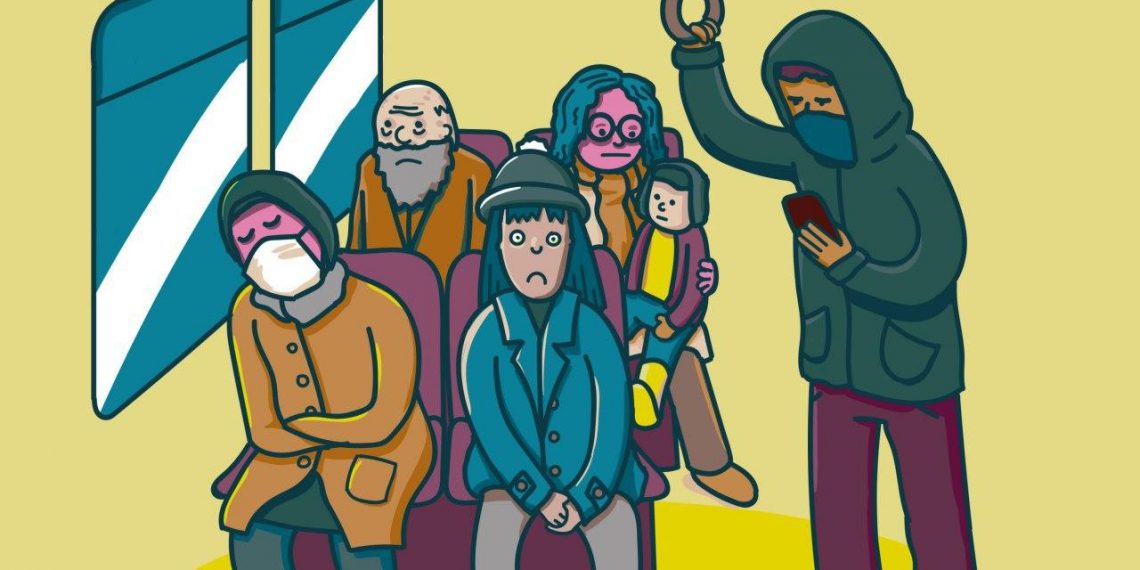
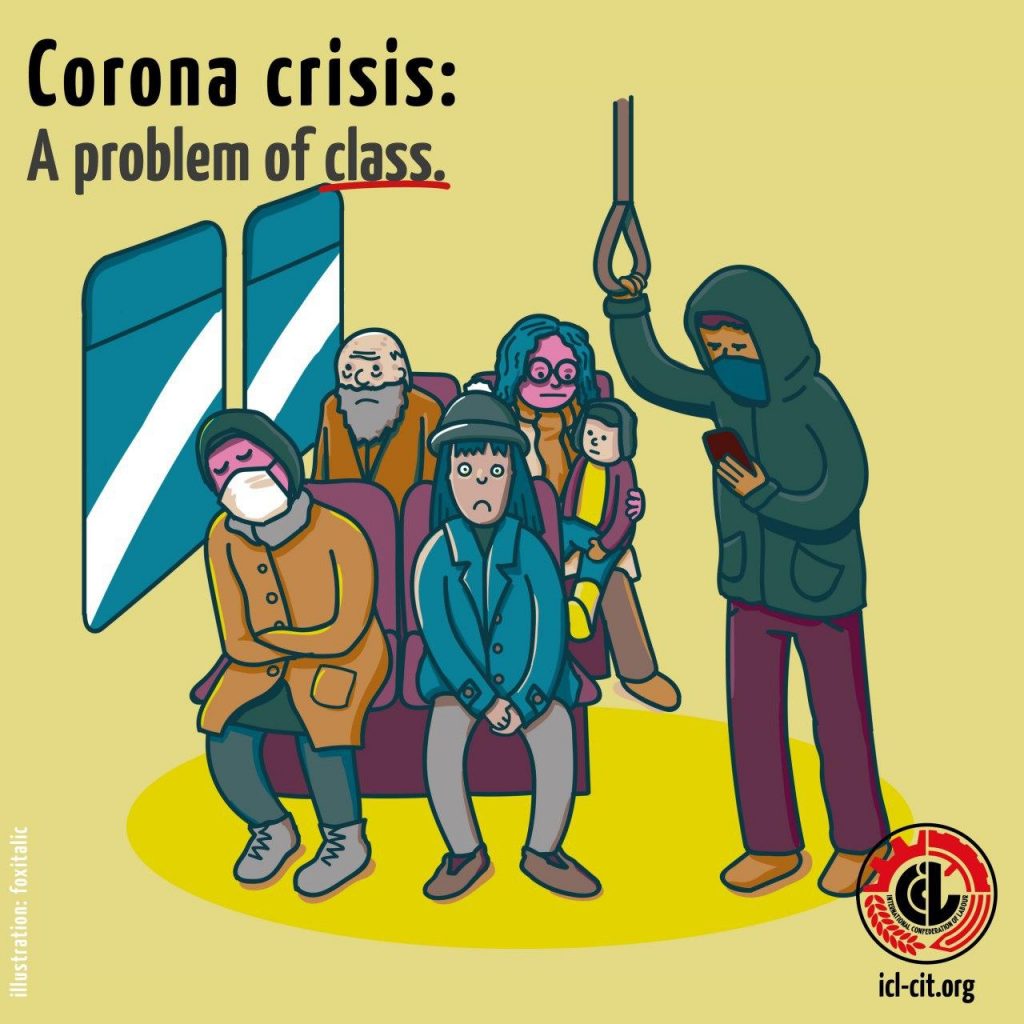
![[Greece] 19th of March 2022 International day of action against Detention Camps](https://www.iclcit.org/wp-content/uploads/camps-360x180.jpg)

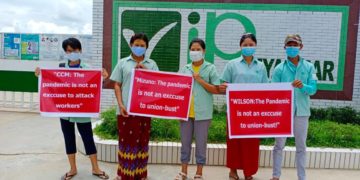
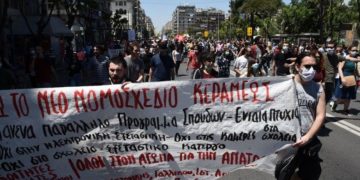
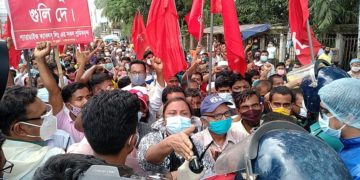


![[FORA] Special transmission of the Argentine Regional Workers Federation for the Conquest of Bread.](https://www.iclcit.org/wp-content/uploads/FORACONQUISTAPAN0105-75x75.png)
